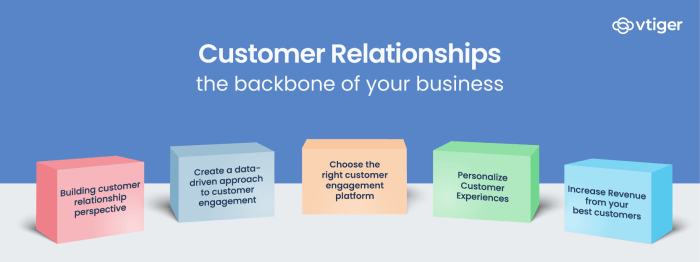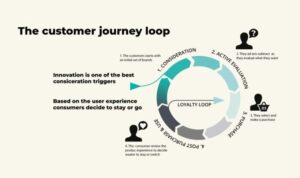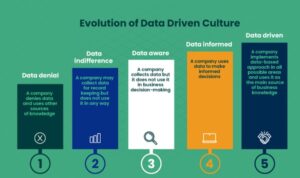Customer Relationship Tips – Get ready to dive into the world of building lasting connections with your customers. From effective communication to exceptional service, this guide has got you covered with all the essentials for nurturing those valuable relationships.
Importance of Building Relationships

Building relationships with customers is crucial for businesses as it helps in creating a loyal customer base, driving repeat business, and generating referrals. When customers feel valued and appreciated, they are more likely to return to a business for future purchases and recommend it to others.
Impact on Repeat Business
Building strong customer relationships can lead to repeat business as satisfied customers are more likely to choose a familiar and trusted brand over competitors. By providing excellent customer service and personalized experiences, businesses can increase customer retention rates and create a loyal customer base.
Impact on Referrals, Customer Relationship Tips
Happy customers who have a positive relationship with a brand are more likely to refer friends and family to that business. Word-of-mouth referrals are powerful marketing tools and can significantly impact a company’s growth and success. By focusing on building strong customer relationships, businesses can leverage the power of referrals to expand their customer base organically.
Impact on Brand Loyalty and Reputation
Customer relationships play a key role in building brand loyalty and reputation. When customers have a positive experience with a business and feel connected to the brand, they are more likely to remain loyal and continue supporting the company. Additionally, strong customer relationships can help protect a business’s reputation during times of crisis, as loyal customers are more forgiving and understanding.
Effective Communication Strategies
Effective communication is key to maintaining strong customer relationships. By utilizing different communication channels and actively listening to customers, businesses can personalize their interactions to meet individual preferences.
Different Communication Channels
- Email: Email is a convenient way to communicate with customers, providing a written record of conversations.
- Phone: Speaking directly with customers over the phone allows for real-time interaction and a personal touch.
- Social Media: Engaging with customers on social media platforms allows for quick responses and a more casual communication style.
Importance of Active Listening
Active listening involves fully concentrating on what the customer is saying, understanding their needs, and responding appropriately. It shows customers that their opinions are valued and helps build trust in the relationship.
Personalizing Communication
- Collect Customer Data: Gather information about customers’ preferences, past purchases, and interactions to tailor your communication.
- Use Personalized Messages: Address customers by name and reference specific details to show you value their individuality.
- Offer Customized Solutions: Provide personalized recommendations and solutions based on the customer’s unique needs and preferences.
Providing Exceptional Customer Service: Customer Relationship Tips

In today’s competitive business landscape, offering exceptional customer service is crucial for building and maintaining strong relationships with customers. Exceptional customer service goes beyond meeting basic needs and expectations; it involves going the extra mile to exceed customer expectations and create memorable experiences.
Handling Customer Complaints Effectively
When handling customer complaints, it is essential to listen actively, empathize with the customer’s situation, and take ownership of the issue. Turning customer complaints into opportunities for relationship-building involves resolving the issue promptly and effectively, communicating transparently throughout the process, and following up to ensure customer satisfaction. By addressing complaints with empathy and urgency, businesses can demonstrate their commitment to customer care and turn dissatisfied customers into loyal advocates.
Examples of Companies with Exceptional Customer Service
Companies like Zappos, Amazon, and Ritz-Carlton are renowned for their exceptional customer service, which plays a significant role in fostering customer loyalty. Zappos, for example, is known for its customer-centric culture, where representatives are empowered to go above and beyond to delight customers. Amazon’s focus on convenience, fast shipping, and responsive customer support has set the standard for online retail.
The Ritz-Carlton’s legendary service philosophy, “Ladies and Gentlemen serving Ladies and Gentlemen,” emphasizes personalized attention and anticipatory service, creating unforgettable experiences for guests. These companies prioritize customer satisfaction and consistently deliver exceptional service, leading to long-term customer relationships and brand loyalty.
Using Technology to Enhance Relationships
In today’s digital age, technology plays a crucial role in enhancing customer relationships. By leveraging various tools and platforms, businesses can better connect with their customers, understand their needs, and provide personalized experiences.
Customer Relationship Management (CRM) Tools
Customer Relationship Management (CRM) tools like Salesforce, HubSpot, and Zoho CRM are essential for managing and analyzing customer interactions throughout the customer lifecycle. These tools help businesses track customer data, interactions, and feedback, enabling them to provide more targeted and effective communication.
Benefits of CRM Tools
- Improved customer segmentation: CRM tools allow businesses to categorize customers based on their preferences, behavior, and purchase history, making it easier to tailor marketing campaigns and offerings.
- Enhanced customer support: By centralizing customer information, CRM tools enable businesses to provide faster and more personalized support, leading to increased customer satisfaction.
- Increased sales and revenue: With better insights into customer behavior and buying patterns, businesses can identify upselling and cross-selling opportunities, ultimately driving revenue growth.
Utilizing Data Analytics
Data analytics plays a crucial role in understanding customer needs and preferences. By analyzing customer data, businesses can gain valuable insights that help them make informed decisions and tailor their products and services to meet customer expectations.
By harnessing the power of data analytics, businesses can anticipate customer needs, personalize experiences, and foster long-lasting relationships.





